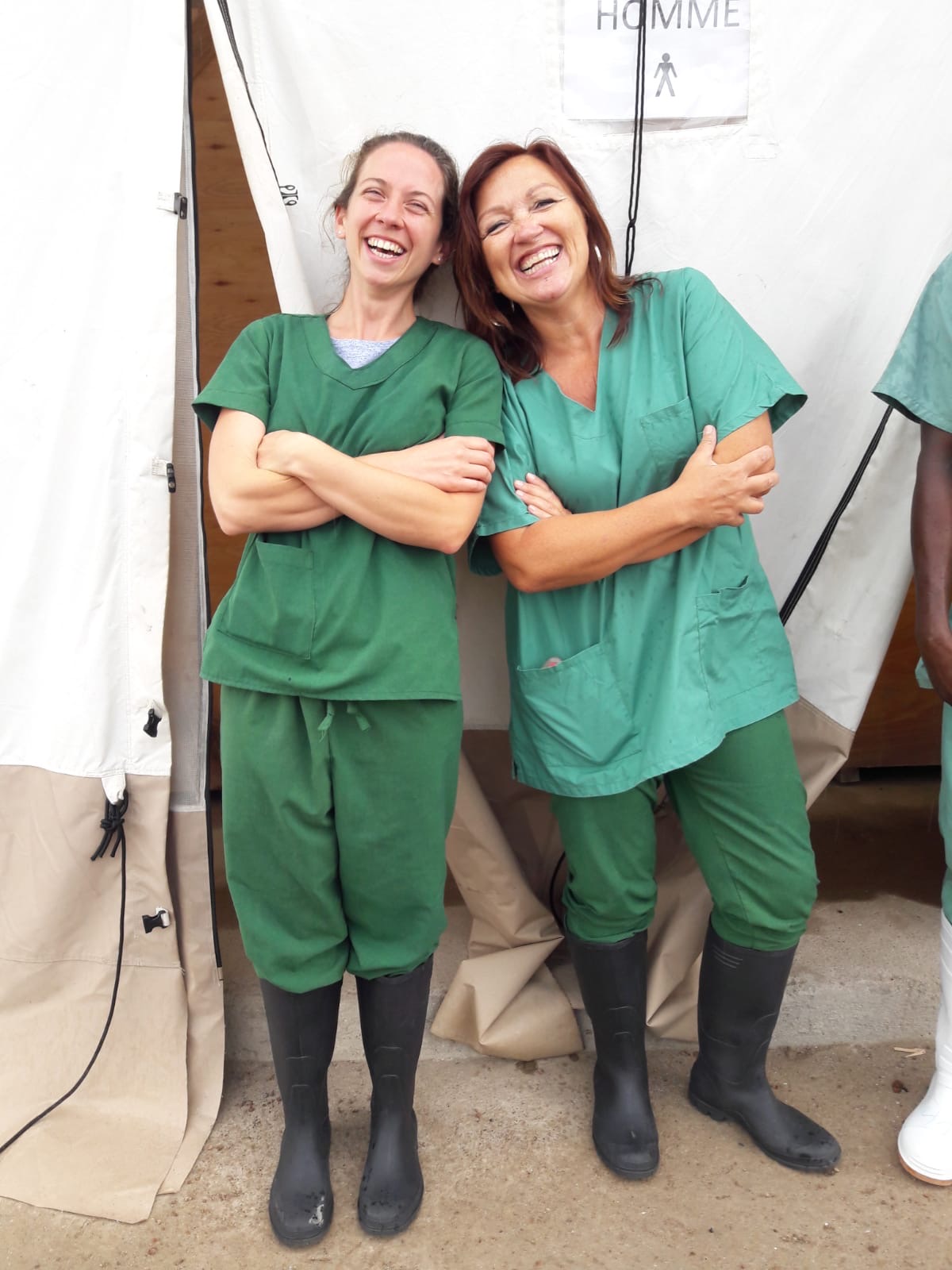Nursing Abroad: ‘You will learn far more than you have to offer.’
9 September 2020

Wenoah Veikley (right) in scrubs at the Ebola Treatment Centre in Goma for training with MSF. Photo supplied.
Wenoah Veikley (BScN ‘01) was born and raised in Edmonton, but always had a penchant for travelling. When she decided it was time to go to university, she uncharacteristically stayed close to home to pursue an education in nursing at the University of Alberta, Faculty of Nursing.
Nursing wasn’t her first career choice at the time; however, her mother was a Licensed Practical Nurse (LPN) and inspired Veikley through her devotion to her profession and the well-being of her patients. She knew attaining a bachelor’s degree at UAlberta would open doors later in her career, especially if she wanted to work abroad.
“I was a volunteer with Canada World Youth right after high school and lived in South Sumatra [Indonesia] for some time with the program. I travelled for a number of years following that experience and when I decided to go to university, I realized that nursing would afford me the opportunity to contribute to the communities I wanted to travel through or live in,” explained Veikley.
After graduation, she accepted a position at the Southwest CARE Center, an HIV specialty program in Santa Fe, New Mexico where she worked in a number of diverse roles. She worked as a forensic nurse for the Santa Fe and Albuquerque Sexual Assault Nurse Examiner programs, specializing in the care of patients who had experienced sexual and/or domestic violence, spent a month in India with vulnerable populations teaching HIV/Hepatitis/Sexually Transmitted Disease prevention and harm reduction, and helped build an HIV/sexual health not-for-profit for young men of colour in Los Angeles, California.
“Many of the patients I have worked within my career have faced challenges in trying to access medical care and information, sometimes as a function of their socioeconomic status, sexual orientation, or perceived lifestyle ‘choices’. Nursing levels the playing field and insists that everyone has the right to expect equitable access to care.”
Veikley currently works with Doctors Without Borders / Médecins Sans Frontières (MSF) as a Nursing Activity Manager for HIV and Tuberculosis in Kimbi-Lulenge, South Kivu, the Democratic Republic of the Congo. Through her diverse work experience — which paved the way for her to work with MSF — she is able to provide equity in access to care for vulnerable and marginalized populations.
Her current role and second mission with MSF involves supervising the HIV/TB program in three health centres and the regional hospital. For the last four months, she has worked in a politically unstable region that is home to a very large, mobile, and populous area of gold miners. East Congo is very rich in natural resources; as a result, miners travel from all corners of the country and across borders looking for gold while living in cramped temporary shelters. The risk of tuberculosis is very real, substance use among this population is common, and the commercial sex work industry thrives in migrant worker communities, dramatically increasing HIV and sexually transmitted disease risk.
Veikley explained HIV and TB can be managed successfully with the adept combination of testing, treatment, and prevention —and even though they have access to medications that are available worldwide, they have to constantly balance their efforts “in a context where these infections still represent challenges in terms of education and stigmatization.” Their work is complicated by a lack of trust in the health care system, the value of traditional healers within the community, and most recently, the emergence of the Coronavirus disease (COVID-19).
“As a nurse here, you will recognize the importance of public health and community health workers in disseminating even the most basic information about health care and disease prevention,” stated Veikley.
Nursing abroad can be exhilarating and rewarding, albeit not for the faint of heart. A career with MSF involves giving up 24/7 access to “creature comforts,” such as a warm bed, hot water, and electricity.
“If you are considering a career in international nursing, you will need to be flexible, willing to work hard, in unpredictable contexts, and you will also need to understand that is likely you will learn far more than you have to offer. You need to be willing to start from scratch, and willing to accept that when you arrive, you will know less than everyone else in the room, so an openness of spirit, a willingness to learn and humility will be invaluable.”
Despite the many challenges and hardships that go hand-in-hand with being an international nurse, and the devastation COVID-19 has caused worldwide, Veikley is pleased the World Health Organization (WHO) has designated 2020 as the Year of the Nurse and Midwife.
“I am enormously proud to be a member of the nursing community and I am grateful that our contribution to global health is being celebrated this year.”